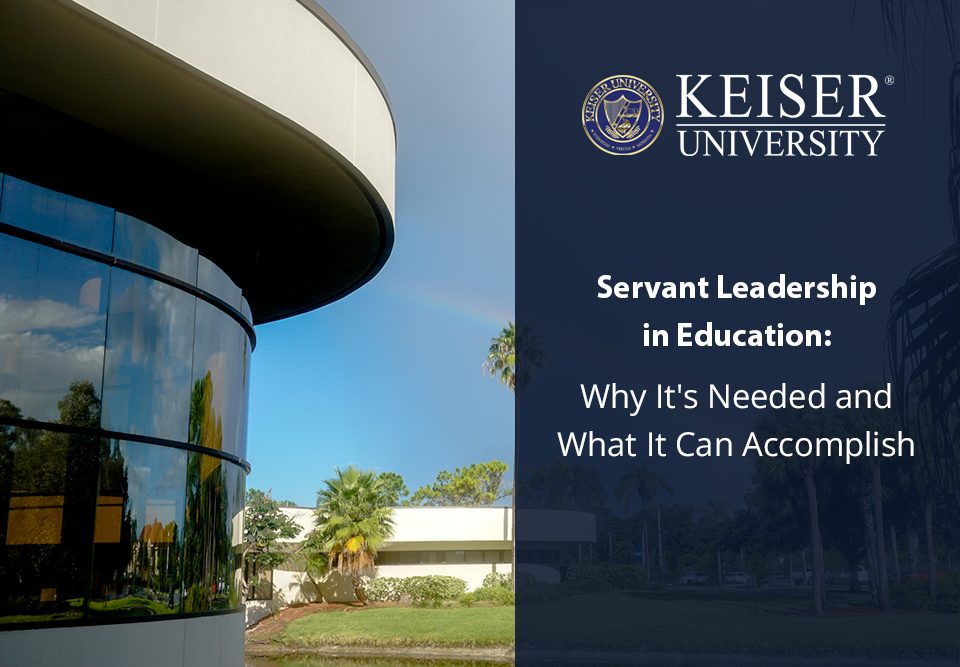Servant leadership is a hot topic in the business world and beyond, including the field of education. Teachers who are compelled to serve their students embrace servant leadership. They are committed to leading and inspiring their students.
Keiser University’s faculty are advocates for servant leadership to support students in becoming change agents in today’s colleges and universities. Keep reading to learn why servant leadership in higher education is necessary and how it can be achieved.
How to Lead by Serving: Dr. Daniel Kuchinka Shares Powerful Insights on Keiser Voices.

What Is Servant Leadership in Education?
Servant leadership always emphasizes putting others first, but in education, this transitions from serving employees to serving students. Educational leaders perform acts of service because they genuinely care for and truly desire to help their students and educational community.
Teachers and professors who commit to this leadership style recognize that their job, first and foremost, is to help their students gain skills, knowledge, and confidence. How they accomplish this, however, will vary for each student. Hence, the need to understand students’ perspectives and use these to shape teaching strategies.
Servant Leadership Style
Servant leadership is just one of many leadership styles worth studying and implementing within the education landscape. Many instructors also benefit from utilizing transformational styles (which emphasize inspiration) and instructional styles (which center around growth and development).
Dr. Kuchinka, faculty at Keiser University and author of Servant Leadership 2.0, believes that servant leadership is fundamental to other leadership styles and is necessary to ensure that those styles achieve their core objectives. “If you are not honest and trusting, have integrity, care for and are transparent with your followers …you are not going to be as effective as a transformational leader or any other type of leader.”
What Makes a Good Servant Leader in Education?
Servant leadership is well-suited to the modern educational landscape. Its core tenets echo essentials from business-based leadership, except, instead of focusing on employees, educational servant leaders put the needs of students first. Putting the needs of students first promotes a stronger, more influential relationship between instructors and students, plus a revitalized teaching and learning experience.
Without adopting a servant leadership style in education, instructors commonly rely on their egos or experiences to guide instruction, rather than looking first to the unique needs of their students. The result? A more rigid and less responsive teaching style that fails to truly accommodate students.
In education, a true servant leader will get to know students, discover what drives them, and what contributes to their unique thought processes. As Dr. Kuchinka points out, “there are not just different learning styles but different experiences, different cultures, and different languages” worth considering.
Traits, Values and Knowledge
We have touched on the need to put students first while building rapport, but there is a lot more to servant leadership. Other servant leadership principles include:
Transparency
Transparency forms the basis of trusting, impactful relationships between teachers and students. Servant leaders are authentic and honest, promoting open communication while sharing their passion-driven vision and values.
When servant leaders are transparent, they encourage students to be open and honest as well. This enhanced communication ensures that instructors have the accurate information they need to make informed decisions and apply a more targeted approach to the unique needs of their students. The result is a feeling of mutual respect, a strong foundation for any productive learning environment.
Humility
Servant leaders strive to remain humble, as they want to keep their focus on serving and supporting students rather than drawing attention to their own background. Servant leaders avoid bragging, even when highlighting experiences or accomplishments that are clearly impressive.
Religion
Dr. Kuchinka highlights the value of religiosity in servant leadership, explaining that this underscores ethics and morality, both of which guide servant leaders. This is a distinguishing factor between servant leadership and other leadership models. Dr. Kuchinka explains, “There’s no other leadership style that values the importance of being religious, valuing others that are religious, or valuing even the ideology and the concepts taught in religion.”
Not Necessary: Charisma
Recognizing what is not necessary to succeed as a servant leader is just as important. Charisma, for example, is not essential. After all, many of history’s most charismatic leaders failed to uphold the servant leadership mentality, and, what’s more, charisma sometimes stands in stark opposition to the core trait of humility. Yes, servant leaders can be charismatic, but they are so much more.
Power vs. Influence
Many people mistakenly equate leadership with power, but these two qualities do not need to be intertwined. Servant leadership relies on influence than on sheer power. Power depends on title, position, and a sense of authority to impose others to act; influence draws on intrinsic sources of motivation, often by revealing a shared point of interest and using that to help all parties involved feel engaged, appreciated, and respected.
Examples of Servant Leadership
Servant leadership is increasingly a force for change in all areas of the economy and modern society, including higher education. This concept has its roots in organizational behavior and management but is now a driving force for positive change in a variety of sectors, ranging from nonprofits and government agencies to information technology and finance. Noteworthy examples include:
Jack Lowe
Former TDIndustries CEO Jack Lowe, Jr. has received multiple awards highlighting his ethics and integrity, both of which are critical to genuine servant leadership. He was instrumental in establishing a culture of servant leadership at TDIndustries, and to this day, the mechanical construction company honors this by “building and maintaining trusting partnerships, a fierce safety culture and the passion for pursuing excellence.”
Father Edwin D. Leahy
Recognized by the Robert K. Greenleaf Center for Servant Leadership, Father Edwin D. Leahy served for decades as the esteemed headmaster at St. Benedict’s Preparatory School. His vision of educational leadership emphasizes trust and empowerment.
In an interview with Authority Magazine, he explained that, when leaders make the genuine effort to develop trust, “students buy into the idea of belonging to something bigger than themselves when they see the consistent acts of empathy…trust builds healing.”
Influential Servant Leaders in Education
Through the years, many of the best and brightest educators and administrators have demonstrated the qualities of servant leaders, even if they have not been formally identified with this label. Other servant leaders, although technically not classified as educators, have made a huge difference in the lives of students and instructors, not to mention within the very structure that forms the basis of our modern educational system.
To illustrate servant leadership’s outsized influence in today’s classrooms and online learning platforms, we have highlighted a few of the most noteworthy servant leaders and their contributions:
Robert K. Greenleaf
As the father of servant leadership, Robert K. Greenleaf was inspired by the organizational patterns he observed in his various leadership roles at AT&T and the American Telephone and Telegraph Company. He was a catalyst for change in the corporate world, even developing the very first corporate personnel assessment center.
Greenleaf’s breakthrough as a writer and consultant arrived with the publication of his seminal work, The Servant as Leader. This influential essay articulated his vision of servant leadership, explaining, “The only authority deserving one’s allegiance is that which is freely and knowingly granted by the led to the leader in response to and in proportion to, the clearly evident servant stature of the leader.”
Through his commitment to servant leadership, Greenleaf inspired several of today’s most impactful leaders. Systems scientist and author Peter Senge believes that “No one in the past 30 years has had a more profound impact on thinking about leadership.”
Anant Agarwal
As the founder and CEO of the online learning platform edX, Anant Agarwal was an early leader in the massive open online course (MOOC) movement. In an interview about his background and his philosophy, he compared teaching to a form of theater, with the process of planning and mapping out lessons resembling choreographing a play.
According to Agarwal, the goal is to spark passion. “My philosophy is that if you’re passionate about it, if you view it as theater, and if you could excite and engage the students, then you simply get out of the way…you have to excite the students and get them to want to learn the material.”
John Dewey
As one of the nation’s most prominent scholars during the early 20th century, John Dewey made his mark as a pioneer of functional psychology and, eventually, as an educational reformer. He viewed educational institutions as inherently social settings, in which students were more likely to feel empowered and inspired if they could draw on the power of community.
Dewey believed that the ultimate educational structure would strike a careful balance between delivering essential knowledge and taking the unique needs and motivations of students into account. While Dewey predated Greenleaf’s manifesto on servant leadership, many of his central ideas about leadership and motivation reflect those proposed by Greenleaf.
Salman Khan
Best known as the founder of the Khan Academy (along with the brick-and-mortar Khan Lab School), Sal Khan strongly believes that quality educational opportunities should be available to all but also believes that educational efforts are more impactful when they are personalized. As such, he advocates for a differentiated model. He feels that instructors must “be able to flex according to students’ needs” to achieve mastery.
Teachers and Professors
Many teachers and professors exemplify servant leadership, and while they sometimes fail to receive the recognition they deserve for their hard work and amazing contributions, they make an undeniable difference in the lives of their students.
We have already highlighted Father Edwin D. Leahy as the ultimate example of an influential servant leader, but he is just one of many educational leaders committed to genuinely listening to students and focusing on meeting their needs.
Educational leaders aren’t always teachers or professors. The Robert K. Greenleaf Center for Servant Leadership has also recognized former basketball coach Jay Wright as an exemplar. His true legacy does not necessarily rest with his team’s championship record but, rather, with how he impacted the lives of the athletes he led. He uses the phrase “keepers of the flame” to reference the need for authenticity in leadership, explaining, “Whatever our team’s core values are, we must live them first.”
Benefits of Servant Leadership in Education
Servant leadership promises to provide a variety of benefits throughout the full scope of education. It can be a powerful tool for boosting motivation and mastery among students, but it also has a positive impact on professors and even entire college communities.
Benefits for Professors and Students
Within the context of the individual class, servant leadership can be life changing. When instructors shift the focus away from themselves and their own plans and egos and toward taking a genuine interest in the lives of their students, they can find their work more compelling and fulfilling. Students tend to respond by showing more respect and appreciation for their professors, and, with their needs met, they may feel better capable of engaging with the material.
Whether the class takes place online or in the confines of the traditional classroom, trusting relationships foster a sense of community, making learning feel less like a to-do list and more like an exciting journey, undertaken together.
Benefits for Colleges and Universities
As colleges and universities face unprecedented challenges, servant leadership promises to drive impressive solutions. This mindset involves a shift from focusing on the goals of the institution itself to meeting the goals of the student population. Interestingly, when students’ needs come first, colleges naturally benefit.
Dr. Kuchinka provides a powerful example “If individual professors are active in their communities and genuinely desire to make a positive difference, their actions will be noticed, and they will influence others”. Students will be eager to seek out these instructors who are known to be genuinely caring. These individual contributions have ripple effects, they eventually contribute to a full-blown culture of servant leadership that translates to a more engaged and supportive student body.
Limitations of Servant Leadership
Servant leaders have a lot to offer, but there are a few limitations worth addressing. These are by no means impossible to overcome, but aspiring servant leaders must be aware of these issues and willing to address them.
- Time-consuming. It takes a lot of time and effort to develop a deeper understanding of students and their needs. It can also be time-consuming to implement personalized strategies and adjust them as needed. This is especially problematic given the modern challenges of education, in which instructors already face heightened demands and, often, not enough resources to help them rise to the occasion.
- Resistance from others. Any model that seems unfamiliar or unconventional is bound to get some resistance, and this is certainly true of servant leadership. While many education professionals are drawn to the basic tenets of this philosophy, some may be less enthusiastic upon seeing how it is implemented: consistently emphasizing responsive teaching methods and truly putting students first.
Teaching Servant Leadership
The world needs servant leaders. While teachers can absolutely lead by example, a more targeted approach may be needed to ensure that the leaders of tomorrow understand what can be gained through this powerful approach to leadership and how it can be implemented, despite the challenges identified above.
Methodology and Process
To build a new generation of servant leaders, colleges need to embed the servant leadership mindset into the very fabric of their culture. Dr. Kuchinka references a six-week training session that has been developed with this culture-centered approach at the forefront. He adds that, while improvement is possible through concerted effort, servant leadership should also be built into the hiring process to ensure that the entire organization is committed to this ideal.
Preparing for a Bright Future as a Servant Leader
Are you inspired by a vision of servant leadership? If so, you may be interested in the leadership programs at Keiser, where we are committed to helping develop tomorrow’s leaders. Our Master of Science in Organizational Leadership provides powerful preparation for the challenges of modern leadership and where Dr. Kuchinka teaches students to be more effective servant leaders. We also offer a Graduate Certificate in Management and Leadership. Reach out to learn more about our leadership-oriented graduate programs.






 The instructors at Keiser University impacted my life. They believed in my ability to become a great graphic designer, regardless of how I felt about my skills. KU helped to prepare me for the real world and got me to where I am today.
The instructors at Keiser University impacted my life. They believed in my ability to become a great graphic designer, regardless of how I felt about my skills. KU helped to prepare me for the real world and got me to where I am today.
